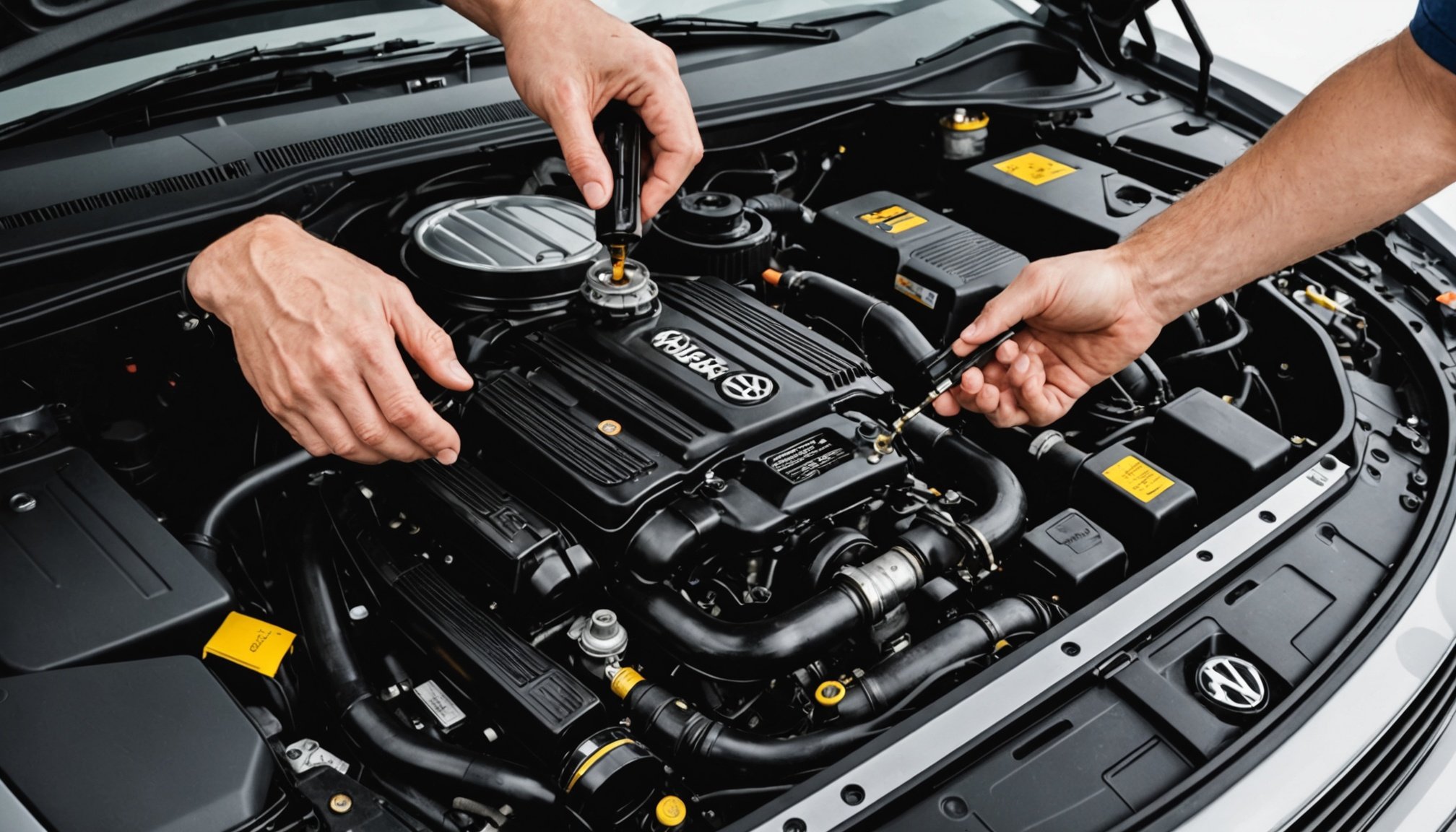Understanding High-Mileage Engine Oil
High-mileage engine oil is specifically formulated for vehicles that have accumulated significant mileage, typically over 75,000 miles. Designed to cater to older engines, these oils contain unique additives that address the specific needs of high-mileage vehicles. Furthermore, they often include seal conditioners to reduce leaks, which is vital for maintaining optimal engine health.
The benefits of high-mileage oil are numerous and particularly relevant for older vehicles such as the Volkswagen Passat, known for its durability and performance capabilities. This specialty oil helps to maintain and even enhance engine performance, overcoming the wear and tear that naturally occurs over time. One of the primary advantages is the reduction of leaks and oil consumption, thanks to seal conditioners that rejuvenate aged seals. This leads to a decrease in emissions and an improvement in overall fuel economy.
Also read : Boost your porsche cayman’s cooling power: upgrade to a high-performance radiator for optimal efficiency!
Additionally, high-mileage engine oil can significantly improve engine performance and longevity. Its unique formulation aids in lubricating engine components more effectively, reducing friction, and preventing sludge build-up. This not only extends the lifespan of your vehicle’s engine but also ensures smoother operation and better performance, crucial for sustaining the reliability of vehicles like the Volkswagen Passat.
Compatibility with Volkswagen Passat Models
Understanding the Volkswagen Passat oil specifications for various models is crucial for maintaining your vehicle’s performance. Each model may have distinct engine oil requirements that help in optimising efficiency and longevity. It is essential to reference your vehicle’s manual to identify the appropriate oil type.
In the same genre : Unlock your acura rsx”s potential: a comprehensive guide to installing an adjustable fuel pressure regulator for ultimate performance boost
Adherence to the recommended oil specifications ensures the car operates efficiently. Neglecting this can lead to engine wear or damage. Common misconceptions exist, suggesting that any oil can work in a Passat. This is a myth and can result in significant repair costs. Always use oil that adheres to the manufacturer’s specifications.
For instance, while one model may require synthetic oil with specific viscosity, another might operate on mineral oil but with a different grade. This highlights the necessity of familiarising oneself with the exact Volkswagen Passat oil specifications the model demands.
Compatibility is not just about using any oil but using the correct one tailored to your car’s needs. Keeping abreast of these requirements ensures your engine remains in optimal condition, providing a smoother and reliable driving experience. Always consult trusted sources or professionals if uncertain about the engine oil requirements for your specific model.
Comparing Different Brands of High-Mileage Engine Oil
When selecting the best high-mileage engine oil, engine oil brands play a crucial role in the decision-making process. The top brands in the market often offer distinct features catering to various vehicle needs. Each brand aims to enhance your vehicle’s performance by providing the most robust formula for high-mileage automobiles.
Overview of Leading Brands
Top engine oil brands such as Castrol, Valvoline, and Mobil 1 are renowned for their high-mileage formulas. Castrol offers oils specifically designed to reduce leaks and oil consumption in engines with significant mileage. Valvoline’s offering is tailored for enhanced engine durability, with added anti-wear additives. Mobil 1 promises excellent oxidative stability and engine cleanliness, even under extreme conditions.
Key Features to Consider
When undertaking a high-mileage oil comparison, consider factors such as viscosity ratings, the presence of wear protection additives, and the oil’s capacity to seal ageing engines.
Consumer Reviews and Ratings
Product reviews indicate a preference for oils that maintain viscosity over time and minimise leaks. Consumers highlight Castrol for its superior leak prevention, while Valvoline is praised for protecting engine parts under high stress. Analyzing abundant customer feedback ensures you select an oil brand that aligns with your vehicle’s specific requirements.
Symptoms Indicating the Need for High-Mileage Oil
Understanding when your vehicle requires high-mileage oil is crucial for its longevity and performance. There are certain engine oil symptoms that you should be aware of. One common indicator is oil leakage. As engines age, seals become brittle, leading to leaks—an unmistakable sign of engine wear. If you spot oil patches below your parked vehicle, it’s likely that high-mileage oil, specifically designed to condition seals, could help mitigate this issue.
Another symptom is increased exhaust smoke. This might indicate that oil is burning faster than usual, a hallmark of worn engine components. High-mileage oil is formulated to reduce oil burn-off, providing a temporary solution to this issue.
Regular maintenance reminders, such as unusual engine noises or reduced fuel efficiency, also signal potential engine wear. Such signs of engine wear emphasize the importance of timely oil changes. High-mileage oil can reduce friction and wear, extending your engine’s lifespan.
Regular oil changes are imperative for maintaining engine health. Consistently addressing these maintenance reminders ensures your vehicle operates smoothly. Opting for high-mileage oil during these changes can be a strategic choice, promoting efficiency once you notice these symptoms.
Expert Tips on Choosing High-Mileage Engine Oil
Navigating the world of engine oils can be daunting, but expert recommendations can simplify your decision-making. When choosing oil for high-mileage engines, it’s crucial to consider specific guidelines from automotive experts. For starters, high-mileage oils are formulated with additives that help condition engine seals, reducing leakage and oil burn-off. This not only extends the lifespan of your engine but also improves performance.
One expert maintenance advice is to focus on your vehicle’s driving habits. If you do a lot of city driving with frequent stops, a synthetic blend with high viscosity might be beneficial. In contrast, highway driving might allow for lighter oils, ensuring smoother operation.
The importance of considering driving conditions cannot be overstated. In colder climates, for instance, oil with a lower viscosity rating can prevent engine stress during start-ups. Conversely, warmer climates may require oils that maintain stability at higher temperatures.
Additional tips include adhering to regular oil change intervals and monitoring oil levels. Keeping an eye on engine performance indicators, such as unusual noises or reduced fuel efficiency, can also signal the need for an oil review. By tailoring your oil choice to these factors, you ensure optimal engine longevity and efficiency.
User Testimonials
User experiences with high-mileage oil for the Volkswagen Passat reveal a range of positive outcomes. Many Passat owners have reported significant improvements in their vehicles’ engine performance. One particular adjustment noted by numerous users is the reduction in engine noise, which enhances driving comfort and experience.
Oil performance reviews from these consumers frequently highlight the tangible benefits experienced. One user mentioned that after switching to high-mileage oil, their Passat’s fuel efficiency improved noticeably. This efficiency equates to more miles per gallon, exemplifying the economic advantage of opting for high-mileage variants.
Moreover, long-term consumer insights show positive impacts on vehicle reliability. High-mileage oil seems to offer a protective effect, extending the longevity of engine components in older vehicles. Testimonials often include stories of cars surpassing mileage ratings with minimal wear and tear, thanks to the enhanced formulation of the oil, which caters specifically to the needs of high-mileage engines.
To summarise, these experiences and reviews emphasize the preventative maintenance aspect of high-mileage oil that goes beyond immediate performance, ensuring a smoother ride and potentially longer engine life for Passat owners. These user insights are invaluable for those considering an oil switch for enhanced vehicle upkeep.
Maintenance Advice for High-Mileage Vehicles
Maintaining a vehicle with many miles under its belt requires keen attention to detail and an understanding of essential practices. In the realm of high-mileage care tips, it is crucial to prioritize regular maintenance. This includes routine oil changes and the use of high-mileage engine oil, designed specifically to reduce wear and tear, condition seals, and minimize leaks.
Why is engine upkeep critical for high-mileage vehicles? Engines with extensive use often suffer from decreased performance and efficiency. To combat this, high-mileage engine oil offers a formulation replete with special additives. These compounds enhance lubrication, fortify seals, and prevent premature engine wear. Your vehicle will run more smoothly, potentially lengthening its lifespan and preserving its performance.
Regular inspections form the backbone of vehicle maintenance at this stage. Regular check-ups, typically every 3,000 to 5,000 miles, can identify potential issues before they become major problems. This allows for responsive maintenance, ensuring minor repairs are addressed promptly, thereby reducing the risk of serious mechanical failures and costly repairs.
Remember, successful vehicle maintenance hinges on being proactive and understanding your vehicle’s needs. By adopting these high-mileage care tips, you not only maintain but can enhance the longevity and reliability of your high-mileage vehicle.
Frequently Asked Questions
When dealing with high-mileage oil, consumers often have several common concerns and inquiries. Here are some of the most frequently asked questions:
What is high-mileage oil and who needs it?
High-mileage oil is specially formulated for vehicles with over 75,000 miles. It contains additives that help reduce oil consumption, smoke, and emissions in older engines. Vehicles with minor leaks or signs of wear benefit from this type of oil.
Will using high-mileage oil extend the life of my engine?
Yes, high-mileage oils can contribute to engine longevity. These oils are designed to improve seal condition and reduce friction, potentially extending engine life through enhanced protection.
How often should high-mileage oil be changed?
It’s generally recommended to follow the vehicle manufacturer’s guidelines, usually every 3,000 to 5,000 miles. However, individual driving habits and conditions may necessitate more frequent oil changes.
Is switching to high-mileage oil harmful?
Switching is typically safe. Concerns arise if existing engine issues, such as severe leaks, are present. Always consult with a vehicle maintenance professional to determine appropriate oil use.
By addressing these FAQs, drivers can make informed decisions about high-mileage oil, leading to improved engine performance and maintenance practices.











